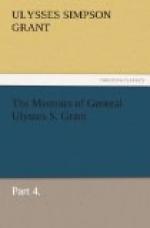The next day after Sherman’s arrival I took him, with Generals Thomas and Smith and other officers, to the north side of the river, and showed them the ground over which Sherman had to march, and pointed out generally what he was expected to do. I, as well as the authorities in Washington, was still in a great state of anxiety for Burnside’s safety. Burnside himself, I believe, was the only one who did not share in this anxiety. Nothing could be done for him, however, until Sherman’s troops were up. As soon, therefore, as the inspection was over, Sherman started for Bridgeport to hasten matters, rowing a boat himself, I believe, from Kelly’s Ferry. Sherman had left Bridgeport the night of the 14th, reached Chattanooga the evening of the 15th, made the above-described inspection on the morning of the 16th, and started back the same evening to hurry up his command, fully appreciating the importance of time.
His march was conducted with as much expedition as the roads and season would admit of. By the 20th he was himself at Brown’s Ferry with the head of column, but many of his troops were far behind, and one division (Ewing’s) was at Trenton, sent that way to create the impression that Lookout was to be taken from the south. Sherman received his orders at the ferry, and was asked if he could not be ready for the assault the following morning. News had been received that the battle had been commenced at Knoxville. Burnside had been cut off from telegraphic communications. The President, the Secretary of War, and General Halleck, were in an agony of suspense. My suspense was also great, but more endurable, because I was where I could soon do something to relieve the situation. It was impossible to get Sherman’s troops up for the next day. I then asked him if they could not be got up to make the assault on the morning of the 22d, and ordered Thomas to move on that date. But the elements were against us. It rained all the 20th and 21st. The river rose so rapidly that it was difficult to keep the pontoons in place.
General Orlando B. Willcox, a division commander under Burnside, was at this time occupying a position farther up the valley than Knoxville —about Maynardville—and was still in telegraphic communication with the North. A dispatch was received from him saying that he was threatened from the east. The following was sent in reply:
“If you can communicate with General Burnside, say to him that our attack on Bragg will commence in the morning. If successful, such a move will be made as I think will relieve East Tennessee, if he can hold out. Longstreet passing through our lines to Kentucky need not cause alarm. He would find the country so bare that he would lose his transportation and artillery before reaching Kentucky, and would meet such a force before he got through, that he could not return.”




